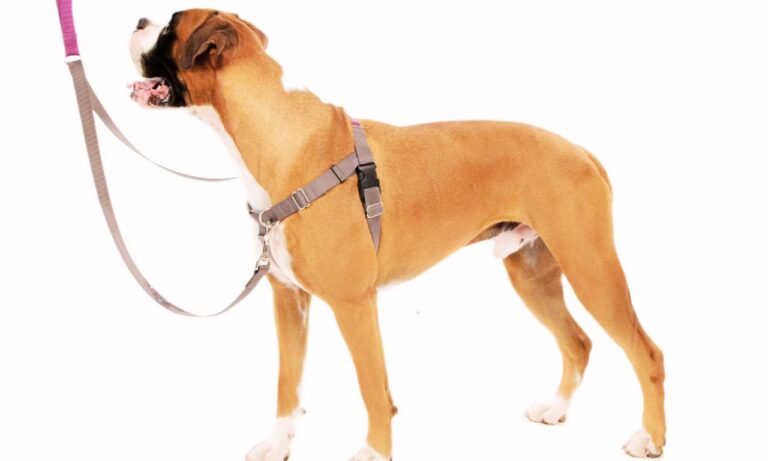Choosing the right collar for your dog is important for their safety and comfort. Citronella collars have become popular as a training tool to stop dogs from pulling or barking excessively. But are citronella collars safe for dogs? For expert tips on how to fit a collar on a Belgian Shepherd, this guide offers simple steps to ensure your dog’s collar fits securely and comfortably.
I will explore what citronella collars are, how they work, their benefits and risks, expert opinions, and safer alternatives. By the end, you’ll have a clear understanding to help you decide if a citronella collar is right for your furry friend.
Blog Highlights
ToggleAre Citronella Collars Safe for Dogs?
Yes, citronella collars are generally safe for dogs when used correctly. They release a burst of citronella spray when the dog exhibits unwanted behavior, like pulling on the leash or excessive barking. The spray is unpleasant but harmless, helping to discourage the behavior without causing pain or fear.
However, it’s important to choose a high-quality collar and use it as part of a positive training program to ensure your dog’s well-being. For detailed guidance on selecting the correct collar size for a Belgian Shepherd, this article provides essential tips to ensure your dog’s comfort and safety.
What Are Citronella Collars?
Citronella collars are special dog collars designed to help train dogs by discouraging unwanted behaviors. They release a small burst of citronella spray when the dog pulls on the leash or barks excessively.
Citronella is a natural oil found in citronella plants, commonly used to repel insects like mosquitoes. In these collars, the spray acts as a mild distraction that helps redirect the dog’s behavior.
How Do Citronella Collars Work?
When a dog starts to pull on the leash or bark too much, the citronella collar detects the movement. It then releases a quick burst of citronella spray near the dog’s nose. The unpleasant smell distracts the dog and interrupts the unwanted behavior.
Over time, the dog learns to associate pulling or barking with the citronella spray, reducing these behaviors without causing pain or harm. Discover the perfect collar size for an Anatolian Shepherd Dog to ensure comfort and security for your furry friend.
Benefits of Citronella Collars
Humane Training Method
Citronella collars are considered a humane alternative to shock or choke collars. They use a natural spray that is unpleasant but not painful, making them a kinder option for training your dog.
Immediate Feedback
The spray provides instant feedback to the dog, helping them understand which behavior is unwanted. This immediate response can make training more effective and quicker.
Safe for All Breeds
Citronella collars are suitable for all dog breeds, including those with sensitive skin or respiratory issues. Unlike shock collars, there is no risk of physical injury when using a citronella collar correctly.
Easy to Use
Most citronella collars are simple to operate. They often come with adjustable settings to control the amount of spray, allowing owners to customize the training based on their dog’s size and sensitivity.
Environmentally Friendly
Citronella is a natural and biodegradable substance, making citronella collars an environmentally friendly training option compared to synthetic chemicals. Learn more about the unique double-layered coat of an Anatolian Shepherd and how to care for it effectively.
Potential Risks and Downsides
Overuse Can Cause Stress
While citronella collars are safe when used correctly, overusing them can cause stress and anxiety in dogs. It’s important to use the collar as a training tool and not rely on it constantly.
Limited Effectiveness for Some Dogs
Not all dogs respond the same way to citronella collars. Some may ignore the spray, especially if they are highly motivated by other factors like food or play.
Requires Proper Training
To be effective, citronella collars should be used as part of a comprehensive training program. Without proper guidance, the collar alone may not achieve the desired behavior changes.
Possible Allergic Reactions
Although rare, some dogs may have allergic reactions to citronella. It’s important to monitor your dog for any signs of irritation or discomfort when using the collar for the first time.
Cost of Maintenance
Citronella collars require regular refills of the spray, which can add to the overall cost of using this training method. For insights on whether Pomeranians should wear a collar, including considerations for safety and alternatives, check out this informative article.
Comparison of Citronella Collars with Other Collar Types
To help you understand how citronella collars stack up against other types, here is a comparison table:
Table: Comparison of Citronella Collars with Other Collar Types
Expert Opinions on Citronella Collars
Veterinarians and Animal Behaviorists
Most veterinarians and animal behaviorists view citronella collars as a safe and humane training tool when used correctly. They appreciate that citronella provides a non-painful way to redirect a dog’s behavior without causing fear or aggression.
- American Veterinary Society of Animal Behavior (AVSAB): AVSAB supports the use of citronella collars as part of a positive reinforcement training program, emphasizing their humane nature.
- Certified Applied Animal Behaviorists (CAAB): CAABs recommend citronella collars as a gentle alternative to aversive training methods, highlighting their effectiveness in certain training scenarios.
Professional Dog Trainers
Many professional dog trainers endorse citronella collars for their ability to interrupt unwanted behaviors without causing harm. They stress the importance of proper use and integration with other training techniques. For a comprehensive guide on what kind of harness is best for a Pomeranian, including comfort and safety tips, check out this article.
- Karen Pryor Clicker Training: Advocates for positive training methods, including the use of citronella collars as a non-aversive tool to enhance training.
- Victoria Stilwell: A well-known dog trainer who promotes positive reinforcement, supports the use of citronella collars when used responsibly as part of a comprehensive training plan.
Alternatives to Citronella Collars
Positive Reinforcement Training
Positive reinforcement involves rewarding your dog for good behavior, encouraging them to repeat those actions. Rewards can include treats, praise, toys, or playtime.
Benefits:
- Strengthened Bond: Builds trust and a positive relationship between you and your dog.
- Sustainable Behavior Change: Encourages long-term improvements without negative side effects.
- Reduced Stress: Creates a happy and stress-free training environment.
Harnesses
Harnesses provide better control without putting pressure on the dog’s neck. They distribute the pulling force across the chest and shoulders.
Benefits:
- No Neck Strain: Prevents damage to the neck and trachea.
- Enhanced Control: Offers better leverage for managing strong or large dogs.
- Comfort: Generally more comfortable for the dog during walks.
Martingale Collars
Martingale collars are designed to prevent dogs from slipping out without causing choking. They tighten gently when the dog pulls.
Benefits:
- Safety: Prevents the collar from tightening too much, reducing the risk of neck injuries.
- Effective Control: Provides gentle correction without harshness.
- Suitable for Training: Useful for training strong pullers while minimizing discomfort.
Head Halters
Head halters fit over the dog’s nose and behind the ears, allowing owners to guide the dog’s head and body.
Benefits:
- Gentle Guidance: Allows for precise control without causing pain.
- Reduced Pulling: Effective in managing pulling behavior during walks.
- Comfort: Generally comfortable when fitted correctly, though some dogs may need time to get used to them.
Clickers
Clicker training uses a distinct sound to mark desired behaviors, paired with rewards. This method helps clear communication between the dog and owner. Discover if the American Eskimo is a guard dog and learn about its suitability for protecting your home.
Benefits:
- Clear Communication: Provides a consistent marker for desired behaviors.
- Effective Training: Enhances learning through positive reinforcement.
- Non-Invasive: Does not involve any physical correction or discomfort.
Legal and Ethical Considerations
Legislation on Citronella Collars
The use of citronella collars is regulated in various countries to ensure the safety and well-being of dogs:
- United Kingdom: Citronella collars are legal and widely used as part of humane training programs.
- Germany: The use of citronella collars is permitted with certain regulations to prevent misuse.
- Australia: Citronella collars are allowed, emphasizing their role in positive reinforcement training.
- United States: Regulations vary by state, but citronella collars are generally legal and accepted as a humane training tool.
These laws reflect the acceptance of citronella collars as a safer alternative to more aversive training methods like shock or choke collars.
Ethical Debate
The ethical considerations of using citronella collars focus on the principles of humane treatment and animal welfare:
- Humane Training: Citronella collars provide a non-painful way to correct behavior, aligning with ethical training practices that prioritize the dog’s well-being.
- Animal Rights: Using non-aversive tools like citronella collars respects the dog’s right to be treated with kindness and compassion.
- Responsibility of Owners: Pet owners have a duty to use training methods that ensure their dog’s safety and emotional health, making citronella collars a responsible choice when used properly.
The ethical debate supports the use of citronella collars as a humane and effective training tool when integrated with positive reinforcement techniques. Learn about the size collar for an American Eskimo to ensure a perfect fit and comfort for your dog.
Making an Informed Decision
Assessing Your Dog’s Needs
Before choosing a citronella collar, consider your dog’s individual characteristics:
- Temperament: Some dogs may respond better to citronella collars based on their personality and behavior patterns.
- Behavioral Issues: Identify the specific issues you aim to address, such as pulling or excessive barking, and determine if a citronella collar is suitable for those behaviors.
- Health Considerations: Ensure that the collar does not aggravate any existing health conditions, such as respiratory issues or sensitive skin.
Consulting Professionals
Seek advice from trained professionals to ensure effective and humane training:
- Certified Dog Trainers: Professionals can recommend appropriate training methods tailored to your dog’s needs and your goals.
- Veterinarians: Offer insights into your dog’s health and behavior, ensuring that chosen training methods are safe and effective.
- Animal Behaviorists: Provide expertise on complex behavioral issues, helping to develop comprehensive training plans that foster positive outcomes.
Considering the Long-Term Impact
When selecting a training method, think about its long-term effects on your dog’s behavior and your relationship:
- Behavioral Sustainability: Choose methods that promote lasting behavioral changes without adverse side effects.
- Relationship Building: Prioritize training techniques that strengthen the bond between you and your dog, fostering trust and mutual respect.
- Emotional Well-Being: Ensure that the training approach supports your dog’s emotional health, preventing stress, anxiety, and fear-based behaviors.
Making an informed decision involves balancing immediate training needs with the long-term well-being of your dog, ensuring a harmonious and fulfilling relationship. Discover why Afghan Hound collars are wide by exploring the unique characteristics of this breed and how wide collars enhance their comfort and style.
FAQs
1. What is a citronella collar?
A citronella collar is a type of dog collar that releases a burst of citronella spray when the dog pulls on the leash or barks excessively. It is used as a training tool to discourage unwanted behaviors.
2. Are citronella collars painful for dogs?
No, citronella collars are not painful. They release a mild, unpleasant scent that distracts the dog without causing any physical harm or pain.
3. How do I use a citronella collar properly?
To use a citronella collar properly, attach it to your dog’s neck and adjust the spray intensity based on your dog’s size and sensitivity. Use it sparingly as part of a positive training program, rewarding your dog for good behavior.
4. Can citronella collars replace other training methods?
Citronella collars are best used in conjunction with other positive training methods, such as positive reinforcement. They should not replace comprehensive training programs but can be a helpful tool within them.
5. Are there any dogs that should not use citronella collars?
Dogs with respiratory issues, sensitive skin, or those that may be stressed by the citronella spray should not use citronella collars. Always consult with a veterinarian or professional trainer before using one on your dog.
Conclusion
Citronella collars offer a humane and effective way to train your dog by discouraging unwanted behaviors like pulling and excessive barking without causing pain or fear. When used correctly as part of a positive reinforcement training program, citronella collars can enhance the training process and strengthen the bond between you and your dog. Hope so, now you know the answer: Are citronella collars safe for dogs?
However, it’s essential to use them responsibly, monitor your dog’s response, and consider integrating other positive training methods for the best results. By prioritizing your dog’s comfort and well-being, you can achieve effective training while fostering a loving and trusting relationship with your canine companion. Find out what style dog collar is best for hounds to ensure comfort and safety for your furry friend.



![Citronella Bark Collar [No Citronella Refill] Spray Dog Training ...](https://m.media-amazon.com/images/I/51Kp8ZbpmIL.jpg)




